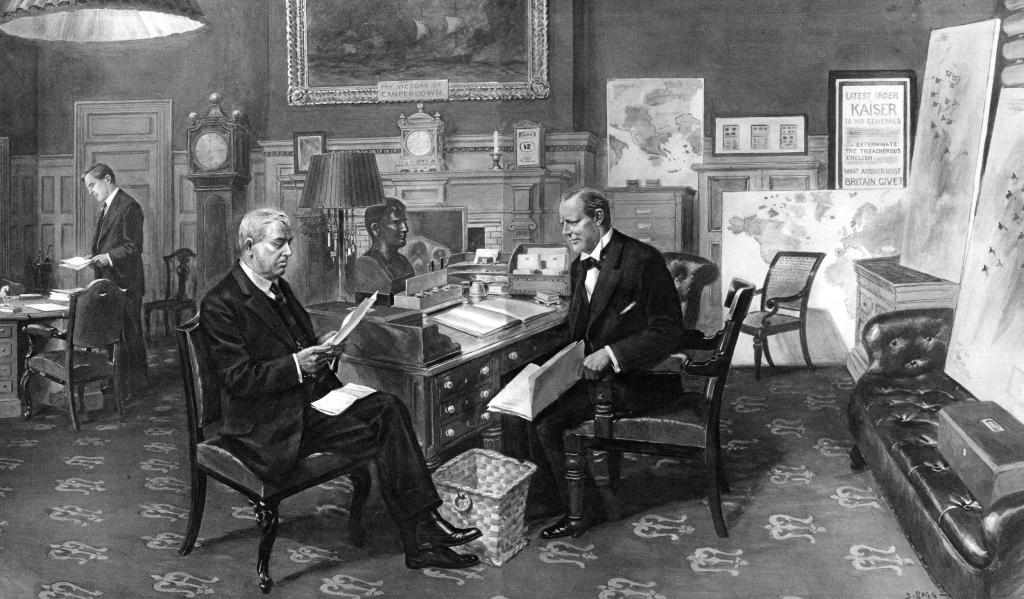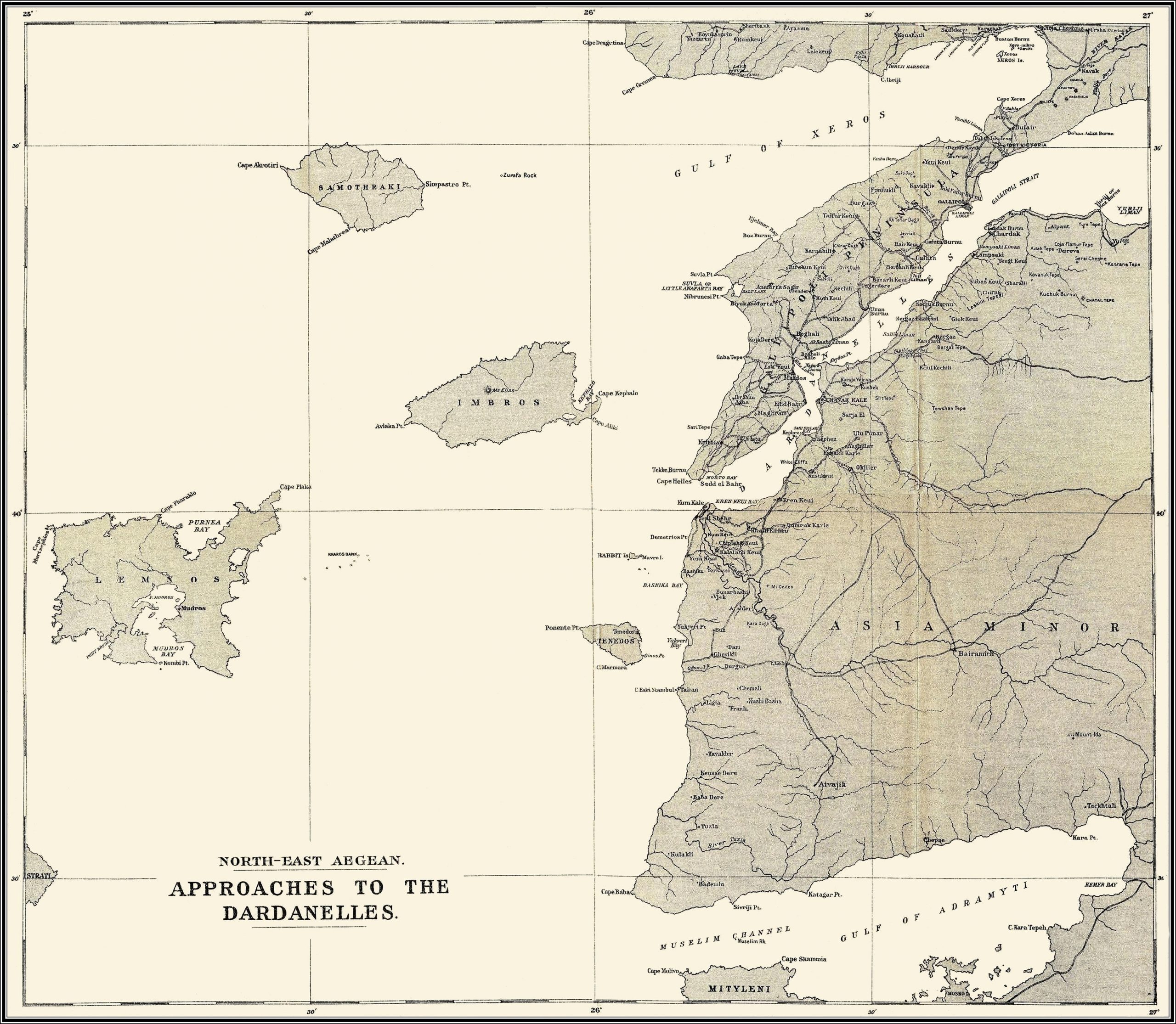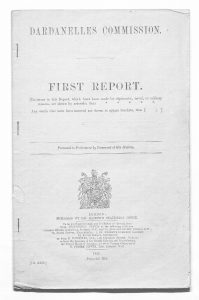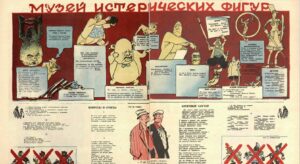Finest Hour 177
Did Churchill Overrule His Naval Advisers? The Admirals Have Their Say

Illustration showing Churchill in consultation with Lord Fisher
October 5, 2017
Finest Hour 177, Summer 2017
Page 28
By Christopher M. Bell
One of the most damning charges regularly levelled against Winston Churchill for his role in the Dardanelles campaign is that he either ignored or overruled his principal naval advisers, who unanimously warned of disaster if a naval offensive were launched without troops to support it. Churchill always insisted that this was untrue, that he had had the support of the admirals. But there is almost no hard evidence to back him up. No minutes were taken of the deliberations among Churchill and his top naval advisers in early January 1915, when the proposal to force the Dardanelles by ships alone was first considered at the Admiralty. Historians have therefore had to rely on later testimony from the participants to reconstruct what happened.
The best—though far from perfect—source we have on these deliberations is the voluminous testimony provided to the official Dardanelles Commission, established by an Act of Parliament in 1916 to investigate why the campaign had been launched, and what had gone wrong. Over the course of twenty days, from September to December 1916, the Commission examined thirty-five witnesses, including all the surviving members of Asquith’s War Council, as well as the admirals who had taken part in the Admiralty’s decision-making process. Did they complain that Churchill had failed to heed repeated warnings that the naval offensive was doomed? A recent study of Churchill’s part in the Dardanelles campaign claims that the testimony of naval leaders “leaves no doubt” that their “opposition to a purely naval operation at the Dardanelles by Fisher, Jackson and all of the naval experts, had been neither half-hearted nor hesitating.”1
Is this an accurate summary of naval testimony? The officials who testified to the Commission in 1916 certainly had a strong incentive to disavow responsibility for launching a naval operation that had clearly been a failure, so it would hardly be surprising if they had thrown all the blame onto Churchill’s shoulders. But after reviewing transcripts of their testimony, Churchill was confident that the Commission would have to absolve him of blame. At the end of November, he wrote to his friend Archie Sinclair that the Commission’s first public report, which would address the origins of the campaign, would be released soon, “and I have good hopes that it will be a fair judgment.”2
Was this merely wishful thinking? The records of the Commission’s hearings reveal that the former First Lord had good reason to be optimistic.
The Witnesses
The first admiral to comment on the Dardanelles project in the early days of 1915 had been Vice-Admiral Sir Sackville Carden, commander of the navy’s Eastern Mediterranean Squadron. Churchill asked Carden on 3 January whether he thought “the forcing of the Dardanelles by ships alone” would be “a practicable operation.” It is often said that Churchill framed his query in a deliberately leading manner, so that Carden would be compelled to support the operation. Some writers go so far as to suggest that Carden was somehow “coerced” into going along with the idea against his better judgement.
Churchill never denied that he had hoped for a positive response when he sent his query, but he dismissed the idea that a high-ranking naval officer would meekly go along with a proposal he disliked simply because it had originated with the First Lord. And he had good reason to adopt this view. In the first four months of the War, Churchill had grown accustomed to his recommendations being shot down by his naval advisers. When the Dardanelles Commission asked Carden whether he regarded Churchill’s telegram as an order, the admiral replied that he “took it as an inquiry.…I formed the opinion that the First Lord wished it to be done if it could possibly be done.” Carden was then asked: “Did you take that as in any way fettering your discretion in giving your opinion?” His reply was a simple “No.”3
The Dardanelles proposal was subsequently reviewed by members of Churchill’s “War Group”—an informal body that included the First Lord of the Admiralty, the First Sea Lord (Admiral of the Fleet “Jacky” Fisher), the Chief of the Admiralty War Staff (Vice-Admiral Sir Henry Oliver), Churchill’s naval secretary (Commodore Charles de Bartolomé), and two other senior admirals then serving at the Admiralty, Sir Arthur Wilson and Sir Henry Jackson.
The junior member of this group, Bartolomé, was the first to testify. He told the Commission that he would have preferred the Dardanelles offensive to be launched as a combined army-navy operation, but he admitted that he had nevertheless been “in favour of the gradual bombardment of the [Dardanelles] forts [by ships alone],” provided the attack could be cancelled if it was not successful.4
Oliver’s testimony also supported Churchill’s version of events. When the Chief of Staff was asked if he considered himself responsible for the decision to launch the naval attack, he stated unequivocally: “Yes, I consider I have got responsibility. If I thought the First Lord and the First Sea Lord were bent on doing something which appeared to me highly imprudent, I should have my opinion recorded that I was not in agreement with it.” One of the Commissioners subsequently asked Oliver if the entire War Group had agreed to the offensive. “To the best of my recollection,” Oliver replied, “yes.”5
Admiral Wilson’s position was somewhat more difficult to pin down. He claimed that he had always been “moderately adverse” to the Dardanelles operation, but admitted that he had not opposed it on practical grounds. “I thought it was a possible success,” he stated,
and, of course, it was a very big prize to work for, and the risks were not great provided we were prepared to leave off when we saw we could not get through. In fact, the risk was really very little more than the loss of prestige, which always attaches to a failure, but I did not expect it would be anything serious.6
Wilson testified that his main objection to the Dardanelles scheme was that it would tie up resources he wanted to use for an assault on the German or Belgian coasts, not that it was likely to fail. He clearly had no objections to inshore operations and coastal bombardments in principle. Wilson confirmed that when Carden’s proposal first arrived at the Admiralty, he had agreed it was worth examining further.7
The most important naval witness was the former First Sea Lord, Lord Fisher, whose resignation in May 1915 had forced Churchill from the Admiralty. By late 1916, the admiral was eager to avoid a clash with his former chief, with whom he had recently reconciled, and the two men had taken care to coordinate their testimony beforehand so as not to incriminate or contradict one another. Fisher said nothing to the Commission that would undermine Churchill’s account. He confirmed that the naval staff had, in fact, supported the operation, as Churchill claimed. “I am perfectly certain,” he stated, “…that I was the only one who stood out against it.”8
The opposition of the First Sea Lord to the Dardanelles proposal would have weakened Churchill’s position if Fisher himself had not downplayed its significance. He stated that he had made his dislike of his project known to his subordinates, but admitted that he had not given the proposal much personal attention. “To a large extent,” he said, “having expressed my indisposition to have much to do with it, I more or less left it alone. Sir Henry Jackson was a very able man, and so was Admiral Oliver, and I more or less stood aside. I backed it up in every possible way as far as executive work was concerned.”9
Fisher’s admission that he had not actively opposed the plan, despite his misgivings, was critical to Churchill’s case. Just as importantly, at no point did Fisher say he had warned the First Lord that the Dardanelles assault was likely to be a costly failure. His main concern, he told the Commission, was that the proposed operation in the Eastern Mediterranean would prevent him from launching an offensive in the Baltic Sea, which he considered a better use of Britain’s naval resources. William Pickford, one of the Commissioners, pressed Fisher on this point during the hearings. “You had no objection,” Pickford asked, “to the experiment suggested by Mr. Churchill on the strength of Admiral Carden’s opinion, being tried?”
Fisher: That is right, only I always had the feeling that there would be a loss of ships, and I wanted to have them to lose in the decisive theatre.
Pickford: Still you did not object to the experiment being tried?
Fisher: No.10

When the Commission sought corroboration of Fisher’s testimony from the other members of the War Group, all agreed that the First Sea Lord had not actively opposed the scheme in its early stages. Indeed, they could not definitely say what Fisher’s views on the operation had been, although Bartolomé and Jackson recalled that their impression at the time was that the First Sea Lord disliked the idea.11 If the First Sea Lord had voiced doubts about the operation in early January, they could have made little impression on his colleagues.
The only naval testimony to cause Churchill serious discomfort was that offered by Henry Jackson, who had succeeded Fisher as First Sea Lord in May 1915, and still held that post when he appeared before the Commission. Jackson had prepared a detailed memorandum on the Dardanelles scheme on 5 January 1915. This document predicted that a British fleet attempting to rush the Straits would likely suffer significant losses, and might subsequently find itself cut off in the Sea of Marmara, short of fuel and ammunition, without any effective means to force an Ottoman surrender.

Under examination by the Dardanelles Commission, Jackson insisted that he had always been strongly opposed to any attempt to force the Dardanelles without an army. And he denied having stated any other view in conversation with Churchill. “I have always stuck to that Memorandum,” he maintained. “I have never changed that opinion, and I have never given anybody any reason to think I did.”12 But Jackson’s claims were undermined by another memorandum he had written on 15 January, in which he examined Carden’s plan for forcing the Straits and recommended that the operation be attempted. Under questioning, it became clear that Jackson was not distinguishing between an attempt to rush the Straits, the subject of his first memorandum, and Carden’s more cautious plan for a gradual neutralization of the enemy’s defences, the plan he endorsed ten days later.
Churchill was eager to ensure that the Commission understood that Jackson’s two memoranda dealt with substantially different proposals. And he sought to discredit the new First Sea Lord’s claim that he had always opposed the operation. When the Commission allowed Churchill to cross-examine Admiral Oliver on 25 October, he asked the Chief of Staff about Jackson’s role in the planning process: “You were in close touch with Jackson?,” he asked. “Yes,” Oliver answered. “He worked in a room near mine and I had frequent conversations with him and I saw all his work, which was done with the greatest care and exactitude.”13 To Churchill’s delight, Oliver confirmed that he (Oliver) and Jackson had been “in general agreement” about the Dardanelles plan.14 Churchill came back to this point at the end of his questioning.
Churchill: Did Admiral Jackson ever express any opinion to you against this operation…?
Oliver: We often discussed the Dardanelles—very frequently.
Churchill: Would you gather he was for or against it; can you give us his general opinion—whether he was for or against it?
Oliver: I should say he was for it.15
Findings
When the Commission wrapped up its first batch of hearings in December 1916, Churchill was not in the least dismayed by the testimony of his former naval advisers. Fisher and Wilson had admitted to giving the Dardanelles project at least qualified support in its early stages, while Oliver and Bartolome confirmed that they had consistently supported the operation. Only Jackson had attempted to distance himself from the decision to launch the offensive, but Churchill was confident that this testimony had been discredited. He told Asquith, “We have got him [Jackson] tighter than anybody else on paper.…I gather the Commission were very unfavourably impressed by his efforts to wriggle out” of his written support for Carden’s plan on 15 January.16
Churchill was confident that he had disproven charges that he had championed the naval offensive in the face of strong opposition from the First Sea Lord and other Admiralty officials. The Commission’s first report, issued in February 1917, therefore came as a bitter disappointment. The document accepted much of Churchill’s account of the decision-making process at the Admiralty, noting that no member of the naval staff had “dissented from the bombardment of the outer forts.” But it added that “Their concurrence was not apparently very cordial,” even if there could be “no doubt that it was given.”17 The report went on to criticize Churchill for having pressed the Dardanelles scheme on the government based on what it described as “a certain amount of half-hearted and hesitating expert opinion.”18
Churchill complained that this verdict did not accurately reflect the testimony collected by the Commission, and he was right to do so. Based on the sworn evidence from members of the “War Group,” Churchill could reasonably claim that there had been a genuine consensus at the Admiralty in the first two weeks of January 1915 that the Dardanelles scheme should be adopted.
Christopher M. Bell teaches at Dalhousie University. His latest book is Churchill and the Dardanelles (2017).
Endnotes
1. Tom Curran, The Grand Deception: Churchill and the Dardanelles (Newport, NSW: Big Sky Publishing, 2016), p. 183. Emphasis in original.
2. Martin Gilbert, ed., Winston S. Churchill, Companion Volume IV, Part 1, January 1917–June 1919 (London: Heinemann, 1977), p. 34.
3. Carden testimony, 6 October 1916, Dardanelles Commission (DC), pp. 2556–58, CAB 19/33, The National Archives, Kew.
4. Bartolomé testimony, 5 October 1916, DC, pp. 1580–85 and 1687–88.
5. Oliver testimony, 5 October 1916, DC, pp. 1829 and 1916.
6. Wilson testimony, 5 October 1916, DC, p. 1926.
7. Ibid., p. 1951.
8. Fisher testimony, 11 October 1916, DC, pp. 3383–84.
9. Ibid., p. 3202.
10. Ibid., pp. 3378–79.
11. Bartolomé, DC, pp. 1592 and 1675; Jackson testimony, 6 October 1916, DC, p. 2150.
12. Jackson, p. 2075.
13. Oliver testimony, 25 October 1916, DC, pp. 5193–206.
14. Ibid., p. 5207.
15. Ibid., pp. 5320–21.
16. Martin Gilbert, ed., Winston S. Churchill, Volume III, Part 2, May 1915–December 1916 (London: Heinemann, 1973), pp. 1578–80.
17. Lord Kitchener and Winston Churchill: The Dardanelles, Part I, 1914–15 (London: The Stationery Office, 2000), p. 67.
18. Ibid., p. 156.
Subscribe
WANT MORE?
Get the Churchill Bulletin delivered to your inbox once a month.





